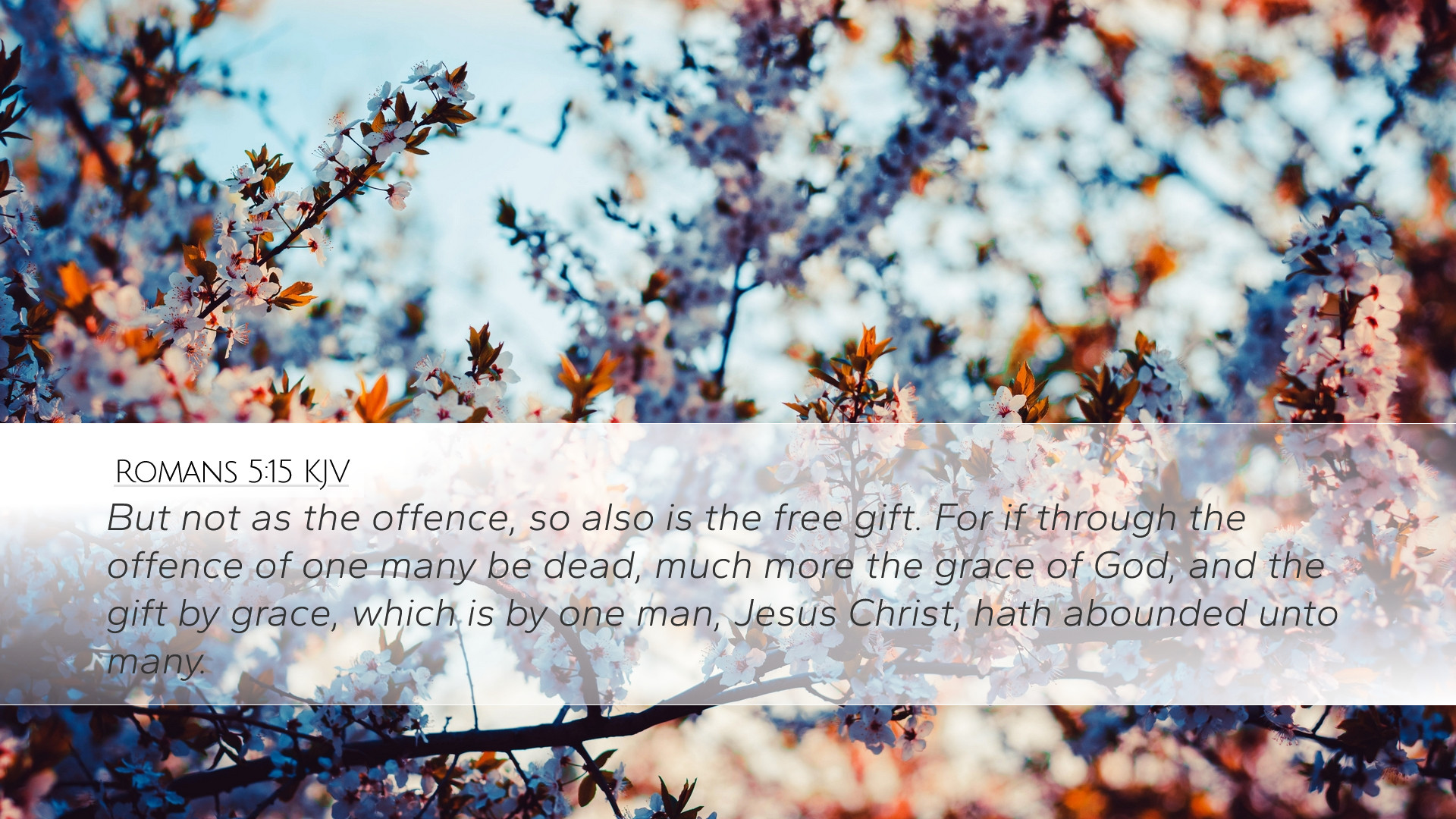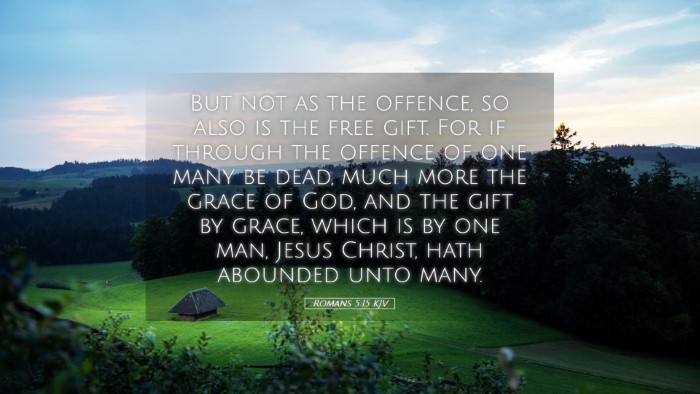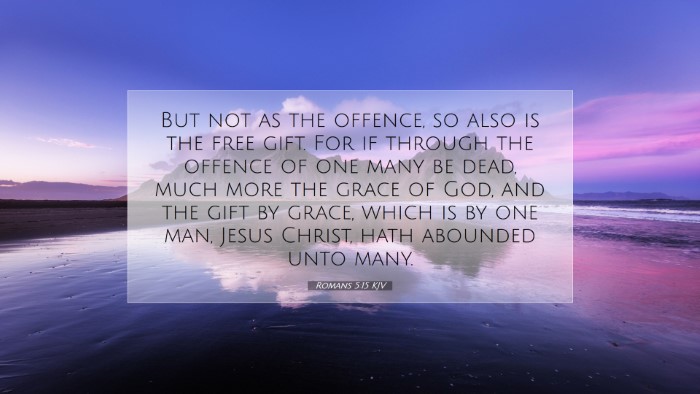Old Testament
Genesis Exodus Leviticus Numbers Deuteronomy Joshua Judges Ruth 1 Samuel 2 Samuel 1 Kings 2 Kings 1 Chronicles 2 Chronicles Ezra Nehemiah Esther Job Psalms Proverbs Ecclesiastes Song of Solomon Isaiah Jeremiah Lamentations Ezekiel Daniel Hosea Joel Amos Obadiah Jonah Micah Nahum Habakkuk Zephaniah Haggai Zechariah MalachiRomans 5:15
Romans 5:15 KJV
But not as the offence, so also is the free gift. For if through the offence of one many be dead, much more the grace of God, and the gift by grace, which is by one man, Jesus Christ, hath abounded unto many.
Romans 5:15 Bible Commentary
Commentary on Romans 5:15
Verse: Romans 5:15 - "But not as the offence, so also is the free gift. For if through the offence of one many be dead, much more the grace of God, and the gift by grace, which is by one man, Jesus Christ, hath abounded unto many."
Introduction
This verse serves as a fundamental pivot in the Apostle Paul's theological argument regarding sin and redemption through Christ. It contrasts the consequence of Adam's transgression with the grace offered through Jesus Christ. The depth of this verse serves to underscore the magnitude of God’s grace in juxtaposition to human sin.
Analysis of Key Themes
This commentary will investigate several key themes as highlighted by renowned public domain commentators:
- Nature of Sin and Death: The sacrificial consequence of Adam's fall.
- Divine Grace: The overwhelming grace of God illustrated in Christ's redemptive work.
- Christ as a Second Adam: The theological implications of understanding Jesus as the one who redeems humanity.
1. Nature of Sin and Death
According to Matthew Henry, the concept of "offence" refers to the original sin committed by Adam, which resulted in death entering the world (Romans 5:12). Adam’s singular act led to a fallen state for all humanity, demonstrating the seriousness of disobedience. Paul communicates that through Adam's disobedience, many were made sinners, highlighting the nature of sin's pervasive impact.
Albert Barnes elaborates that this death is not merely physical but spiritual, emphasizing that through Adam, sin spread to all men, making every person subject to the ultimate consequence of eternal separation from God. The weight of such a condition cannot be understated, as it reveals the desperate state of humanity in need of divine intervention.
2. Divine Grace
The second element in this verse is the description of grace, with Paul asserting that it is "much more" significant in its impact than the offence. Adam Clarke emphasizes this notion of abundance in grace; he suggests that while Adam's sin brought a multitude to death, Christ's grace offers resurrection to even more. The abundance of grace signifies that it is unfathomably greater than the sin that necessitated it.
Grace, by its very nature, is a free gift. Paul underscores that the grace of God is unmerited favor; it is not earned but given. This aligns with the sentiments expressed by Barnes, who notes that the gift of salvation is not contingent on human efforts but solely on God's mercy and the redemptive work of Christ.
3. Christ as a Second Adam
The theological implication of Christ as the "one man" through whom grace is extended is monumental. Matthew Henry draws a parallel between Adam and Christ, referring to Jesus as the Second Adam who rectifies the wrong and restores what was lost. While Adam's disobedience led to condemnation, Christ’s obedience provides the pathway to justification.
Albert Barnes argues that this establishes an essential truth in Christian doctrine; the gifts of righteousness obtained by faith in Christ supersede the effects of sin. Consequently, those who receive Christ experience not just relief from punishment but also the impartation of righteousness that leads to eternal life.
Practical Insights
This examination of Romans 5:15 serves various practical purposes for believers, pastors, and theologians alike:
- The Assurance of Grace: It reminds believers that no matter the depth of their sin, God’s grace is far greater and readily available to those who believe.
- Understanding Sin’s Impact: It's crucial to recognize the seriousness of sin and its consequences, fostering a deeper appreciation for the sacrifice of Christ.
- Encouragement to Evangelize: The juxtaposition of death from Adam and life through Christ provides a compelling motivation for evangelism, underscoring the urgency to share the Gospel.
Conclusion
In Romans 5:15, the Apostle Paul encapsulates the essence of the Christian Gospel: the profound depth of human sin as contrasted with the overflowing grace of God as manifest in Jesus Christ. The insights from Matthew Henry, Albert Barnes, and Adam Clarke collectively deepen our understanding of this passage.
For pastors, students, and theologians, this verse not only challenges us to confront the reality of sin but also invites us to revel in the unmerited grace extended to us through Christ. It is a call to reflect on our own need for grace while extending that grace to others, embodying the message of reconciliation that is at the heart of the Gospel.


